A Curly-Coat Is A Fun Dog To Hunt Over...If You Can Find One.
By M.J. Nelson
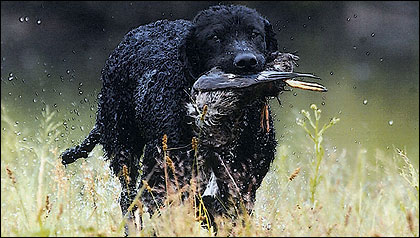 Chocca-Shaw's Winter Wonder MH ("Jade") retrieves a duck. |
The curly-coated retriever--a hard-to-find breed in the United States--has always had, from the time of its inception in Great Britain, the reputation of being a "meat dog." Generally owned by a gamekeeper or a poacher instead of a peer of the realm in its native home, the curly was developed to find and retrieve birds passed by other dogs following a driven hunt. In the hands of less reputable characters, the curly's job probably was finding and fetching birds in the middle of the night.
It is possible that the curly-coated retriever was the first of all the modern curly breeds. There are many references dating back to at least the mid-15th century to a curly-coated water spaniel, said to have had outstanding retrieving and hunting ability. Shakespeare even made a reference or two to "water spaniells" in his works. These water dogs are likely in the early ancestry of most if not all the modern retriever breeds.
In the 1800s there were a number of curly-coated breeds, including the water spaniel, the Tweed water spaniel and the Wetterhoun, that were being developed and could have been ancestors of the modern curly-coated retriever. Or the curly could have been a contributing ancestor to modern breeds with curly coats. The only definite statement that can be made about the development of the curly-coat is that there is nothing certain about how the breed came into existence.
Curly-coats are frequently mistaken as some sort of poodle mix by people unfamiliar with the breed, but although their curly coat does, in some ways, resemble the natural coat of a poodle, there is considerable dispute over whether there actually is any poodle in the breed's background. Poodles were not present in England at the time the curly-coat breed was first recognized, although poodles were present on the continent. Furthermore, the curly-coat sheds its coat at least twice a year, while the poodle does not. It is just as likely that the curly-coat may have been an important factor in the development of the poodle as it is that the poodle contributed to the rise of the curly-coat.
The Versatile Curly-Coat
Jim Crosby, president of the Curly-Coated Retriever Club of America, said that the "meat dog" background of the breed was one reason why the breed is very versatile. "The gamekeepers required the dogs to perform multiple jobs. That is one of the things that makes this breed unique," Crosby noted. "They do a good job with just about any task you ask them to do.
"In the early days of the breed, the gamekeepers even used them to help search for poachers at night. This is one reason why both colors of the breed, black and liver, have a matte rather than a shiny coat--so it didn't reflect any light when they were hunting poachers after dark. In addition to bird hunting, they were used to hunt fur and to recover large game that had been shot when the shot was not immediately fatal. They had to have the kind of calm, sensible temperament that would allow them to do whatever job was required. As a result, even now, and even when they are puppies, the breed is not 'wired' as is the case with some of the other retriever breeds."
Sue Shaw noted that this calm attitude was one of the virtues of the breed, in her estimation. "They hunt close and are not as hyper and fast as some of the other retriever breeds. As a result, they don't seem to miss birds. They are exceedingly loyal, which may be one reason why they hunt close to the gun. They also seem to specifically hunt and find birds for you rather than wanting to do it for themselves.
"While they do mark extremely well on water retrieves as well as land, I believe they excel as upland dogs. They always seem to have great noses. They were originally bred to be the 'clean-up' dog, the one the gamekeepers took out to flush and find birds the hunters had missed with their retrievers. So a well-bred hunting curly preserves that particular skill."
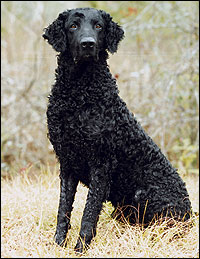 Ch. Karakul Black Rain JH WC ("Reno"), one of Jim and Paula Crosby's curly-coats. |
This is not to say that the breed doesn't have a quirk or two. Mary Veitch said, "While the curly requires little formal training to make a good upland bird hunter and retriever, they tend to be aloof and independent. They can take fair corrections but it takes them some time to recover from a hard correction. Their aloofness can lead to a dog that's very soft or sensitive to hard corrections. [Curly-coats] are easily bored by drills. You have to keep things interesting or they get stale."
Sue Shaw added that it seems you have to earn the respect and confidence of a curly before you can start training them and have them listen to you. "They are very intelligent dogs and would very much rather do things their own way. Once they do respect you, they usually give in and do it your way. While that process can take a long time, if you are persistent, it comes out beautifully in the end.
"Training my dog Jade was challenging when she was young. We had battle after battle. But I had faith that she could do the work and we ultimately had many fun and successful years running hunt tests at the master level."
One particularly unusual aspect of the breed, according to Jim Crosby, is that somewhere between the ages of 10 and 12 months, everything goes south in training. "I don't know what it is or why it happens but somewhere around the 10-to-12-month age, they quit. It is like they hit a wall. Some stay in this state for only a couple of weeks while others are gone for as long as six months.
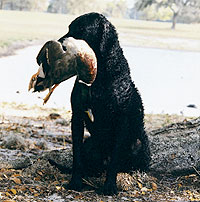 HR WR Chocca-Shaw's Brinstone JH WC WCQ ("Rain") demonstrates that waterfowl are also an important part of a curly-coat's world. |
"This is an extremely frustrating period for a dog trainer. In these situations, the natural first response is to increase the force or the pressure. Except that's exactly the wrong thing to do. In fact, there's only one thing you can do and that's wait. Wait until they get over it. You don't have a bad dog and it hasn't lost its mind. Eventually, if you just stop with them, they'll come out the other side.
"Typically this 'shut down' lasts a month or two. I take mine out to the field and simply let them play
during this period. Every now and then, I throw a bumper to see if they've come out of the funk. When they do come out, they're just as they were before they hit that wall."
Training The Curly-Coat
How easy or difficult is it to train a curly? It depends upon what you are trying to get them to do and how you go about getting them to do it. "This is a breed that is sometimes too smart for its own good," said Crosby. "You can do the same drill 150 times with a Lab and they'll do it the same way every time. That does not work with a curly. They can be extremely creative and they do not take well to repetitive training. They are independent and independent thinkers that will pick and choose who they associate with.
"Of course, this makes sense. The Brits needed a dog that was not a robot. They needed one that could adapt quickly to changing circumstances--in other words, a dog that could think on its feet. They can find a way through just about anything they put their minds to. Also, they will quit if you exceed the threshold of what they are ready to accept. They get their feelings hurt very easily and you absolutely cannot bully them.
"Force-fetching does not work well with a curly. If you inflict pain, they resent being treated that way. They are not particularly good 'collar' dogs. You have to be willing to negotiate with them but they are generally willing to do things your way if you can make the case for them. You have to have a sense of humor to train them or you'll be slitting your wrists or considering canine homicide. But they are wonderful dogs. You just have to be able to laugh at yourself when you are working with them."
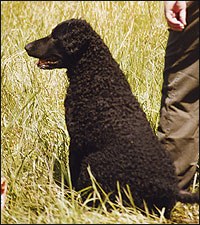 Ch. Charwin Tracer SH ("Flint"), Mary Veitch's curly-coat, at the working test at the 2003 Curly-coated Retriever Club of America's national specialty. |
Sue Shaw emphasized that this is a breed that is very strong-willed and independent. "But at the same time, I also want to emphasize that they can be quite soft. In my opinion, it takes a bit more training, and training sessions have to be carefully thought out with regard to what you want to accomplish in each session. You really can't hit a curly with too much at one time. You have to find that fine line between training them or boring them and wasting an entire session without accomplishing anything."
There are some drawbacks to owning a rare breed, particularly if you not only hunt with the dogs but also like to keep them sharp in the off-season by running in hunt tests. "One of the major problems I've encountered running the curly-coats in hunt tests, particularly AKC hunt tests, is that the judges have never seen a curly and have no idea how the breed hunts and works," said Crosby.
"As a consequence, in the senior and master divisions, I've had dogs that have run perfectly good tests with high marks in four of the five scoring categories that wound up being disqualified for 'style.' When I pressed the judges for an explanation, it turned out that they dumped the dogs because they didn't run the tests like Labradors. Well, folks, they're not supposed to run the tests like Labradors. They're supposed to run the tests like curly-coats."
Finding The Rare Curly-Coat
Finding a good hunting dog is always a challenge. But the challenge increases exponentially when the breed you are seeking had only 171 individual registrations in 2004. As is the case with all sporting breeds, when you do find a likely litter, it is very important to inquire about the health clearances of the parents. Curly-coats have the same health problems as the other retriever breeds--hip and elbow dysplasia, the common eye problems such as progressive retinal atrophy and less serious problems like entropion and ectropion.
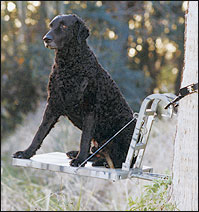 International Champion, Ch. HR Elflock-Ranah's Rising Son CD JH CGC WCQ ("Sam"), one of Jim and Paula Crosby's curly-coats, waits for incoming ducks. |
But peculiar to this breed is the problem of patterned baldness. This is often misdiagnosed as a thyroid deficiency. It is suspected some sort of autoimmune deficiency causes the condition. What is known is that curly-coats with this condition are more likely to have allergies and reproductive problems. Many times dogs mildly affected by the problem will have full coats but only have real curls on their necks and backs.
All three of these curly-coat fanciers said that the best place to start looking for one of these rare retrievers was with the Curly-Coated Retriever Club of America, which maintains a breeders' list. "It is not always easy to find a dog with a lot of hunting desire when you are looking at a rare breed," said Shaw. "It's rarer still to find breeders who are making an effort to preserve that hunting desire. I recommend that people ask breeders, 'Do you hunt with your dogs?'
"But you have to go beyond that basic question. You need to ask the breeder if they do any type of hunt testing and if the dogs have titles, or if they can show you ribbons as proof of their success, as that is a sure sign that they have some desire and are trainable. That doesn't mean that if the dog is not from good hunting stock it absolutely won't hunt, but it makes training a lot easier if the desire is already there.
"It is also my opinion that people who run their dogs in performance competitions are, for the most part, very conscientious about breeding. When they do a breeding they are almost always trying to improve desire, trainability, temperament or birdiness in their line."
If you are looking for something different in a retriever, you could not find a breed that is more so than the curly-coat. And that, say these three curly-coat lovers, is a significant part of the breed's appeal. "I chose this breed because I wanted something different. I wanted something no one else had. A curly-coat definitely qualifies," said Mary Veitch.






